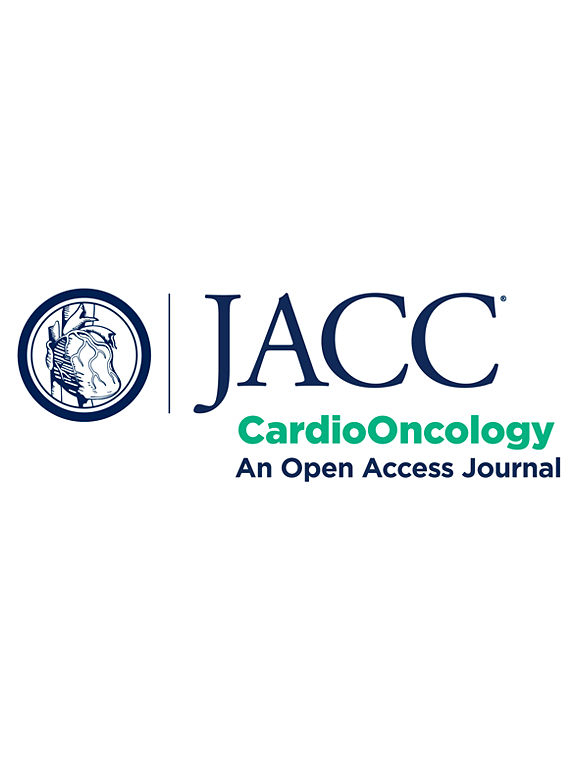接受免疫治疗患者的心肌肌钙蛋白筛查和临床结果。
IF 12.8
1区 医学
Q1 CARDIAC & CARDIOVASCULAR SYSTEMS
引用次数: 0
摘要
背景:免疫检查点抑制剂(ICIs)与心肌炎等心脏毒性有关。然而,关于心脏生物标志物筛查的实施和结果的数据仍然有限。目的:本研究的目的是检查心脏肌钙蛋白I (cTnI)监测与基于症状的分诊对接受免疫治疗的患者的影响。方法:对2019年1月至2021年10月在免疫治疗期间接受常规连续cTnI监测的成年人进行单中心回顾性队列研究。对于cTnI升高的患者,分析了临床表现、管理和结果。主要的心脏不良事件包括心律失常、心肌炎、心力衰竭、急性冠状动脉综合征、中风和心包积液。患者从第一次服用ICI开始随访24个月。结果:428例患者(平均年龄67.1±13.9岁,男性60.3%)中,42例(9.8%)监测到cTnI升高。与有症状患者相比,无症状患者更常接受门诊评估(88.0% vs 17.6%;P < 0.001)和继续免疫治疗(68.0% vs 35.3%;P < 0.001),而有症状的患者更常接受心肌炎特异性诊断,如心脏磁共振成像(58.8% vs 8.0%;P = 0.001),接受免疫抑制(47.1% vs 8.0%;P = 0.008)。cTnI升高后1.5年主要不良心脏事件的累积发生率为19.0% (95% CI: 7.0%-31.1%),有症状患者比无症状患者显著更高(亚分布HR: 18.9;95% ci: 2.2-162.5;P = 0.008)。在2年随访中,有症状患者的全因死亡风险显著增高(HR: 3.24;95% ci: 1.06-9.94;P = 0.04)。总共有6例患者被诊断为心肌炎,无心脏相关死亡。结论:cTnI监测结合基于症状的分诊可以促进心肌炎等心脏毒性的早期干预和治疗。本文章由计算机程序翻译,如有差异,请以英文原文为准。
Cardiac Troponin Screening and Clinical Outcomes in Patients Receiving Immunotherapy
Background
Immune checkpoint inhibitors (ICIs) are associated with cardiotoxicities such as myocarditis. However, data on the implementation and outcomes of cardiac biomarker screening remain limited.
Objectives
The aim of this study was to examine the impact of cardiac troponin I (cTnI) surveillance integrated with symptom-based triaging in patients receiving immunotherapy.
Methods
A single-center retrospective cohort study was conducted among adults who underwent routine serial cTnI monitoring during immunotherapy between January 2019 and October 2021. For patients with elevated cTnI, clinical presentation, management, and outcomes were analyzed. Major adverse cardiac events included arrhythmia, myocarditis, heart failure, acute coronary syndrome, stroke, and pericardial effusion. Patients were followed for 24 months from their first ICI dose.
Results
Among 428 patients (mean age 67.1 ± 13.9 years, 60.3% men), 42 (9.8%) had elevated cTnI detected through monitoring. Compared with symptomatic patients, asymptomatic patients more often underwent outpatient evaluation (88.0% vs 17.6%; P < 0.001) and continued immunotherapy (68.0% vs 35.3%; P < 0.001), whereas symptomatic patients more often underwent myocarditis-specific diagnostics such as cardiac magnetic resonance imaging (58.8% vs 8.0%; P = 0.001) and received immunosuppression (47.1% vs 8.0%; P = 0.008). The cumulative incidence of major adverse cardiac events at 1.5 years following cTnI elevation was 19.0% (95% CI: 7.0%-31.1%) and was significantly higher in symptomatic vs asymptomatic patients (subdistribution HR: 18.9; 95% CI: 2.2-162.5; P = 0.008). Symptomatic patients had a significantly higher risk for all-cause mortality at 2-year follow-up (HR: 3.24; 95% CI: 1.06-9.94; P = 0.04). In total, 6 patients were diagnosed with myocarditis, with no cardiac-related deaths.
Conclusions
cTnI surveillance integrated with symptom-based triaging can facilitate early intervention and treatment of cardiotoxicities such as myocarditis.
求助全文
通过发布文献求助,成功后即可免费获取论文全文。
去求助
来源期刊

Jacc: Cardiooncology
Multiple-
CiteScore
12.50
自引率
6.30%
发文量
106
期刊介绍:
JACC: CardioOncology is a specialized journal that belongs to the esteemed Journal of the American College of Cardiology (JACC) family. Its purpose is to enhance cardiovascular care for cancer patients by publishing high-quality, innovative scientific research and sharing evidence-based knowledge.
The journal aims to revolutionize the field of cardio-oncology and actively involve and educate professionals in both cardiovascular and oncology fields. It covers a wide range of topics including pre-clinical, translational, and clinical research, as well as best practices in cardio-oncology. Key areas of focus include understanding disease mechanisms, utilizing in vitro and in vivo models, exploring novel and traditional therapeutics (across Phase I-IV trials), studying epidemiology, employing precision medicine, and investigating primary and secondary prevention.
Amyloidosis, cardiovascular risk factors, heart failure, and vascular disease are some examples of the disease states that are of particular interest to the journal. However, it welcomes research on other relevant conditions as well.
 求助内容:
求助内容: 应助结果提醒方式:
应助结果提醒方式:


